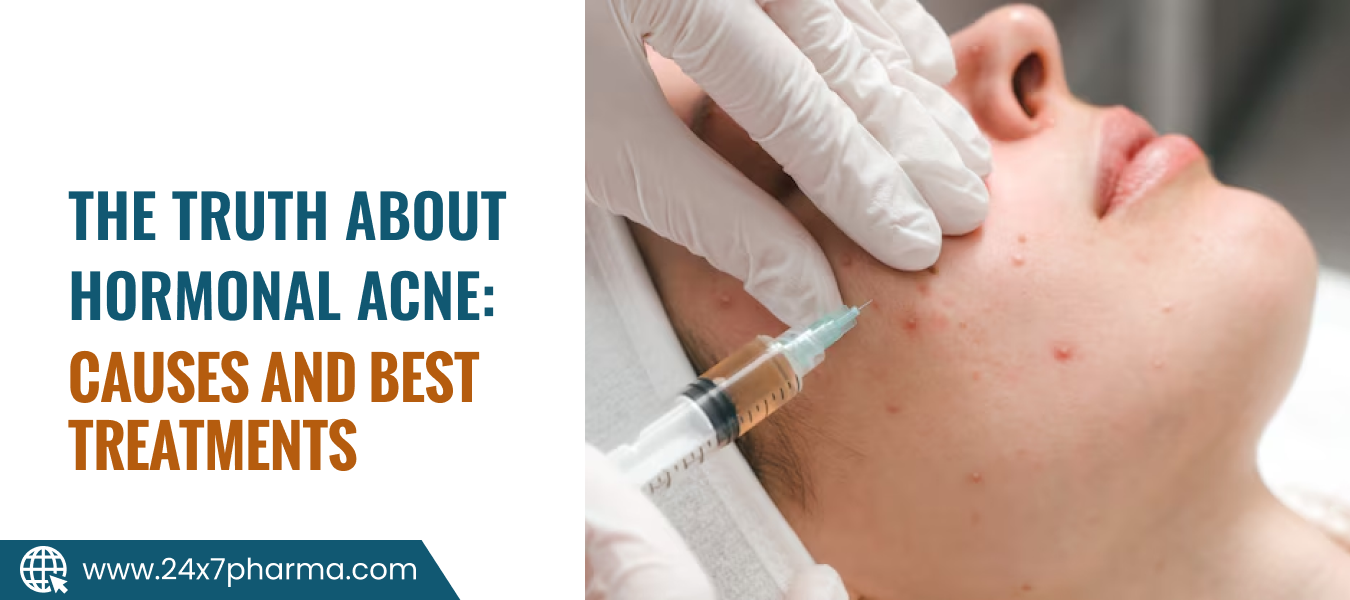Hormonal acne is a frustrating condition that affects both teenagers and adults. Unlike typical acne caused by clogged pores, acne results from internal imbalances. Fluctuating hormones, especially androgens, trigger excess oil production, leading to breakouts on the jawline, chin, and cheeks.If you’ve tried multiple skincare products with no success, the real issue might be hormonal causes rather than surface-level problems. Understanding the root causes and using the best treatments for acne can help you achieve clearer skin.
What Is Hormonal Acne?
It is primarily influenced by androgens, which stimulate sebum (oil) production. This excess oil clogs pores and allows acne-causing bacteria to thrive. Unlike blackheads and whiteheads, hormonal acne often appears as deep, cystic breakouts that are painful and difficult to treat with regular cleansers.
Common Signs of Hormonal Acne:
✔ Deep, painful cysts under the skin
✔ Breakouts around the jawline, chin, and lower cheeks
✔ Acne flare-ups before menstruation
✔ Persistent pimples despite good skincare
If these symptoms sound familiar, you may need a seek an professional guidance to manage breakouts effectively.
Read More: Types of Acne: Understanding the Different Forms and How to Treat Them
Acne Causes: Why Do You Get It?
1. Hormonal Fluctuations
Androgens like testosterone increase oil production, making your skin prone to acne. This is why breakouts often occur during puberty, menstruation, pregnancy, or menopause.
2. PCOS and Hormonal Acne
Polycystic Ovary Syndrome (PCOS) is one of the leading causes of acne in women. PCOS triggers excessive androgen levels, leading to persistent acne and oily skin. Balancing hormones for clear skin may require medical intervention, such as oral contraceptives or anti-androgen medications.
3. Stress and Acne
Chronic stress increases cortisol levels, which can worsen acne. If you’ve noticed breakouts during exams, work deadlines, or emotional stress, stress and acne could be linked. Managing stress through meditation, exercise, and proper sleep can help.
4. Diet and Hormonal Acne
Certain foods can trigger acne by raising insulin levels, leading to increased oil production. Common dietary triggers include:
- Dairy products (milk, cheese)
- High-glycemic foods (white bread, sugary snacks)
- Processed foods (fast food, chips)
Switching to a diet for hormonal acne with whole foods, leafy greens, and omega-3-rich foods can improve your skin.
Best Treatments for Hormonal Acne
A. Medical Treatments
1. Birth Control Pills
Oral contraceptives help regulate hormone levels and reduce acne flare-ups, especially for those with PCOS-related breakouts.
2. Anti-Androgen Medications
Spironolactone is often prescribed to block androgen effects and reduce sebum production, making it effective for stubborn acne.
3. Topical Retinoids
Ingredients like tretinoin and azelaic acid help unclog pores, reduce inflammation, and fade acne scars over time. Using retinoids correctly is crucial to avoid irritation.
4. Isotretinoin (Accutane)
For severe, cystic acne that doesn’t respond to other treatments, Isotretinoin is a powerful option. However, it requires close medical supervision due to potential side effects.
B. Skincare for Hormonal Acne
A proper skincare routine is essential for managing breakouts.
- Best face wash for acne: Look for salicylic acid or benzoyl peroxide cleansers to unclog pores.
- Exfoliate wisely: Use gentle exfoliants like azelaic acid to reduce dead skin buildup.
- Moisturize & protect: Non-comedogenic moisturizers and SPF 30+ sunscreens are crucial to prevent post-acne marks.
C. Natural Remedies for Hormonal Acne
Some hormonal treatments at home can complement medical care:
- Tea tree oil – Natural antibacterial properties help fight acne-causing bacteria.
- Spearmint tea – Some studies suggest it helps reduce androgen levels in women.
- Apple cider vinegar – A natural toner that may help balance skin pH.
When Should You See a Dermatologist?
If your acne persists despite lifestyle changes, consult a dermatologist for professional guidance. Signs that require expert care include:
✔ Painful, cystic acne that doesn’t improve with OTC products
✔ Frequent scarring or dark spots
✔ Signs of hormonal imbalances (irregular periods, hair loss, weight gain)
A dermatologist can design a personalized acne treatment based on your skin type and hormonal profile.
Conclusion
It is treatable with the right combination of medical treatments, skincare, and lifestyle changes. Understanding hormonal causes and choosing the best treatments for hormonal acne can help you regain clear skin. If home remedies and skincare fail, don’t hesitate to seek expert advice.

